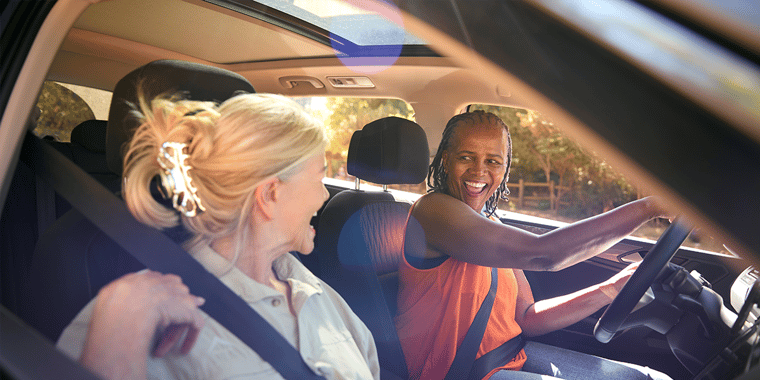New Lease on Life: 4 Ways to Prep for Retirement While Leasing a Car
No matter where you’re at in life, obtaining and maintaining a car is a big commitment. Retirement, though, brings its own special considerations – and changes.
Your income will probably look different than it previously did, and your risk tolerance may evolve. Your day-to-day life will change, too. Maybe you’re planning on staying local and driving less, or planning on a cross-country road trip and driving more. And, unfortunately, your health may impact your vehicle needs as you age.
What can you do? Everyone’s situation is different, but we spoke with a couple of professionals to get their expert advice on preparing for retirement as a lessee in general. So, whether you’re looking ahead to retirement or already there, let’s dig in. It’s time to talk cars and leasing – in this special edition for retirees.

1. Assess Your Needs
The first step in making sure your vehicle meets your retirement needs is to figure out exactly what those needs are.
Three key considerations to keep in mind are “budget, reliability, and resale value,” according to Michael Espinosa, CERTIFIED FINANCIAL PLANNER™ professional and President of TrueNorth Retirement Services. Remember that the cost of a car isn’t just the base MSRP – you’ll also need to account for “insurance, maintenance, and fuel….whether you are planning on leasing or buying a car.”
At the end of the day, remember that not all costs are strictly monetary. “Since retirees often prefer to spend their time on enjoyable activities rather than dealing with car troubles,” adds Espinosa, “a dependable car can contribute to a more stress-free retirement.”
If you’re looking for a new vehicle, consider whether leasing limitations on mileage or wear-and-tear might come back to bite you at turn-in. (If you’re currently leasing and already worried about it, we can help you skip the inspection and dealership hassle.) If you’re looking into buying, make sure to factor in maintenance costs and responsibility – as well as weighing whether or not you want to get ‘locked in’ to a long-term auto loan if you finance.
2. Review Your Options
If you’re “of retirement age” and need a new car, you have the same general options available to you as always: buying or leasing. This time, however, you may want to think about your choices a bit differently. If you’ve bought in the past or are thinking about buying now, it may be a good time to consider leasing instead.
Monthly payments on a leased car are generally lower than on a new – or even used – car. A lease ensures your standard maintenance costs are covered (which may not be a plus if tinkering in your garage all day is your retirement plan). And leasing also requires less commitment than a purchase, allowing you extra flexibility in your particular circumstances.
If you know you’ll use a car for years and years to come (especially if you plan on driving a lot), buying may be the best choice for you. If you have a lot of cash on hand and feel ready to commit to a big down payment, this option could save you more money in the long-run, too.
3. Learn How to Get More Out of Your Lease
If you’re currently leasing, you probably have a few extra options available that could benefit you (or someone you love) as you head into retirement. As your lease-end date approaches, you could certainly take your vehicle back to the dealership and re-lease or buy. But if you’ll still need a vehicle, there’s another route you can take: buying out your lease.
Essentially, a lease buyout allows a lessee (you) to purchase and keep their leased car. (Want to learn more? Read here.) If you finance this purchase with a lease buyout loan, you’ll simply keep driving and making monthly payments on the vehicle, without worrying about mileage limits or wear-and-tear. If you like your leased car and want to keep it for yourself, a lease buyout can be a great deal on a ‘used’ car that you’re already familiar with.
Another option: if you’re not too attached to your leased car but have a family member or friend looking for a good deal, they could buy out and keep your leased car instead. This option works like a regular buyout, with just a few extra steps to get the vehicle in your acquaintance’s name.
Why would buying out your leased car be a good deal for someone you know? For one, “the value of the buyout was agreed upon at lease inception,” says Leigha Gutierrez, Lease End’s expert Title Manager. The total cost of a buyout includes taxes and fees, but if your lienholder underestimated your vehicle’s future value, a buyout based on your vehicle’s residual value may be a steal in this market.
It's also a plus that the car’s previous owner – you – is familiar to whoever is purchasing the car. A leased car generally has a verifiable maintenance history, meaning you know what you’re getting into. Besides all that, a buyout with Lease End is just easy. According to Gutierrez, the process is “not complicated at all. We handle the paperwork, and many times can eliminate the DMV or dealer interaction.” If you’re looking to actually enjoy your retirement instead of haggling with the dealership, a lease buyout may be the way to go.
4. Keep an Eye Out
No matter how you choose to fulfill your transportation needs, make sure to watch out for predatory sales tactics targeted at those in retirement. Espinosa warns, for example, that some dealerships may try and rush retirees into a decision with enticing ‘limited-time offers.’
If you’re looking into leasing, watch out for misleading lease terms that look attractive on the surface but are riddled with fees in the fine print. “Take your time and carefully consider any offer,” says Espinosa. “It’s okay to sleep on a major decision [and] to take longer than a few hours when making a financial decision of this magnitude.”
To protect yourself (and your finances), be sure to do thorough research on a car and its market value, obtain multiple quotes, review terms carefully, and consult with a trusted person or financial advisor before making any big decisions.

The Wrap-Up
As you head into retirement, you’ve got a lot to keep in mind. Ideally, your car should be the least of your concerns.
Be sure to take your time with any big decisions. You’ve been planning your retirement for a while now, so make sure your vehicle will work for your (new) lifestyle and budget. If you want to avoid a long-term commitment and are looking for low monthly payments, leasing can be a great option.
If you’re currently leasing and like your car enough to keep it, buying out your lease could be a great choice for you. Or, if you’re currently leasing and know a family member or friend who’s interested in buying your leased car, you may be able to hook them up with a good deal on your used car instead. In either case, Lease End will handle all the tricky parts of a buyout so you can sit back and enjoy your retirement – you’ve earned it.
You know your own situation the best, but don’t be afraid to ask for support. Do your research, reach out to trusted advisors, and talk to your peers to see what’s worked for them. It’s your retirement, so make it what you want. And if you want to spend less time worrying about your lease-end and more time enjoying your life, you know who to call. Visit us at leaseend.com or call (888) 307-5197 to learn more, or just get started below.
Enter Your License Plate to Get Started.